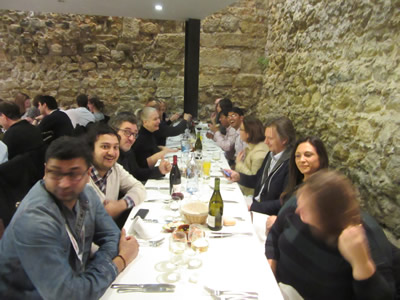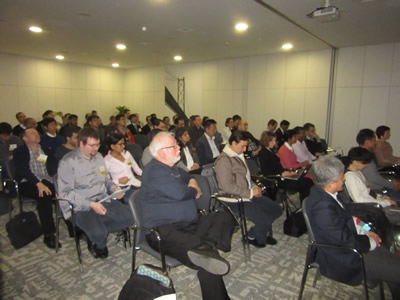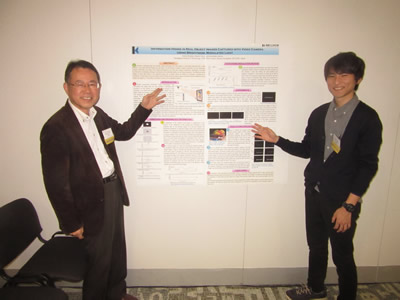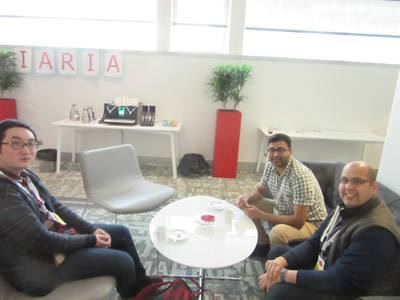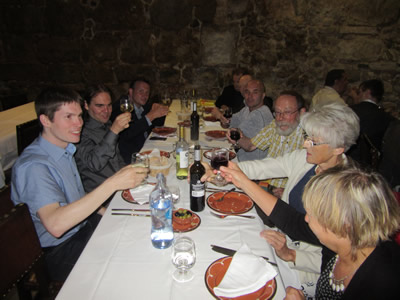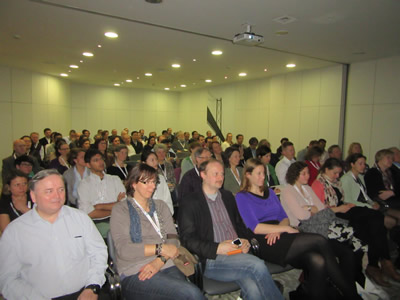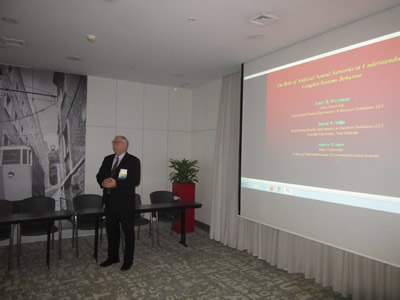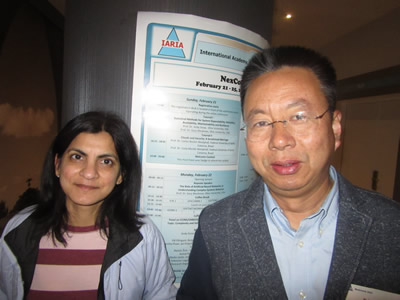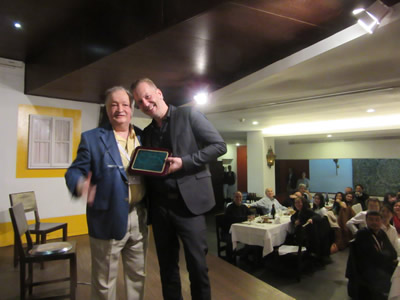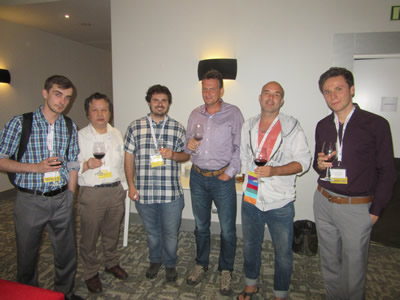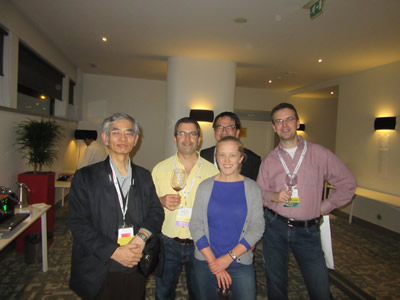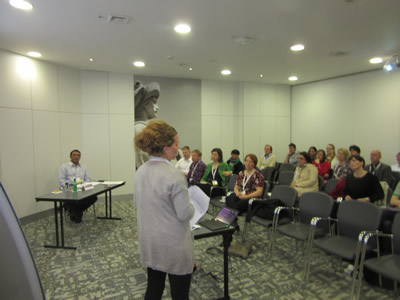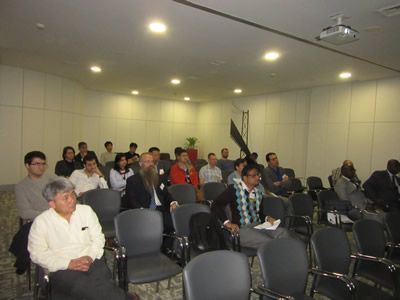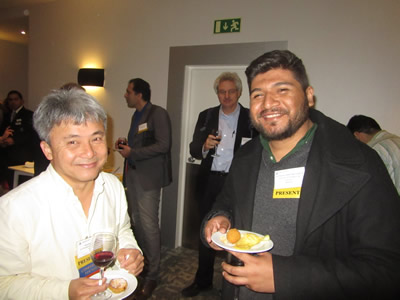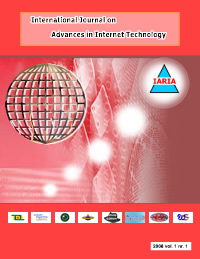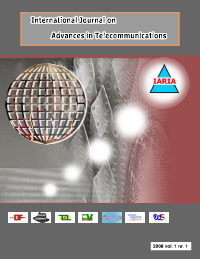ICSNC 2022 - The Seventeenth International Conference on Systems and Networks Communications
October 16, 2022 - October 20, 2022
ICSNC 2022
Onsite and Online Options: In order to accommodate a large number of situations, we are offering the option for either physical presence or virtual participation (pdf slides or pre-recorded videos).
ISSN: 2163-9027
ISBN: 978-1-61208-998-0
ICSNC 2022 is colocated with the following events as part of SoftNet 2022 Congress:
- ICSEA 2022, The Seventeenth International Conference on Software Engineering Advances
- ICSNC 2022, The Seventeenth International Conference on Systems and Networks Communications
- CENTRIC 2022, The Fifteenth International Conference on Advances in Human-oriented and Personalized Mechanisms, Technologies, and Services
- VALID 2022, The Fourteenth International Conference on Advances in System Testing and Validation Lifecycle
- SIMUL 2022, The Fourteenth International Conference on Advances in System Simulation
- SOTICS 2022, The Twelfth International Conference on Social Media Technologies, Communication, and Informatics
- INNOV 2022, The Eleventh International Conference on Communications, Computation, Networks and Technologies
- HEALTHINFO 2022, The Seventh International Conference on Informatics and Assistive Technologies for Health-Care, Medical Support and Wellbeing
ICSNC 2022 Steering Committee
| |
 |
Marc Kurz
University of Applied Sciences Upper Austria, Faculty for Informatics, Communications and Media
Austria
|
|
 |
Jin-Shyan Lee
National Taipei University of Technology (Taipei Tech.)
Taiwan
|
| |
 |
Rony Kumer Saha
BRAC University
Bangladesh
|
|
 |
Eugen Borcoci
University Politehnica of Bucharest
Romania
|
ICSNC 2022 conference tracks:
Advanced features
SDN, SDX, NFV; 4G/5G and advanced mobile Internet; Internet of X (everything, things, people, etc.); Internet, Virtualization and Cloud; Internet and Big Data; Sensing and sensor networks; Energy-aware networks; Content-oriented networking; Cellular cognitive networks; Future routing mechanisms; Cloud-based services; Online interactive services; Mobile services
Slicing and 5/6/7G technologies
Network slicing models; 5G Network slicing Architecture; 5G/6G Networks slicing; End to End (E2E) network slicing; Automated networks slicing; Network Slice as a Service(NSaaS); Service slicing; IoT service slicing; Slicing-as-a-Service (SlaaS); Slicing and orchestration; Latency-sensitive 5G services; Differentiated slice-based 5G services; 5G E2E (End to End), 6G Cellular data networks; Indoor 5G Open Radio Access Network (O-RAN); 5G mmWave; 7G and 8G network and High speed internet. Network slicing market. Networks slicing ROI (Return on Investment); 6-7-8G and ROI.
Wireless networks
3G/4G/5G integration; Wireless protocols, architectural and design concepts; Design and implementation of mobile information systems; Wireless communications and mechanisms; Antenna and RF subsystems; Coding & modulation & equalization; Channel modeling and characterization; Equalization/Synchronization; Wireless technologies; Wireless applications & services; IP Multimedia subsystems (IMS); Wireless and mobility; Wireless-wireline convergence; Radio communications systems; Specialized wireless networks; Management of wireless networks; Position on standards & fora on wireless networks; Business models on wireless networks; Communications regulations, Spectrum management; Software-Defined Radio (SDR) [ architectures, hardware, software, signal processing and smart antennas, etc.]
High speed networks
Technologies, protocols, and applications for high speed networks; Voice over high speed networks; Services and interconnections of high speed networks; Technologies for High speed optical networks; Optical burst switching; End-to-end applications; Optical control plan; Advanced optical technology architectures; Design of high speed systems and networks; Methodologies and development tools for high speed networks; Management and control of high speed networks; Performance in high speed networks; Security aspects in high speed networks; QoS/SLA in high speed networks; Diagnosing high speed networks; High speed networks and NGN
Sensor networks
Architectures and protocols for wired and wireless sensor networks; Internet of Things architectures and implementations; Design of sensor networks; Instrumentation and models for deployment of sensors networks; Power in sensor networks; Ad hoc and wireless sensor networks; Management and control of sensor networks; Performance in sensor networks; Security and reliability aspects in sensor networks; Information assurance in sensor networks; QoS/SLA in sensor networks; Applications, case studies and prototypes with sensor networks
Mobile and Ad hoc networks
Mobile technology and fundamentals; Analytical and validation models for mobility; Architecture and routing protocols for mobile networks; Architectures, frameworks, fundamentals on ad hoc networks; Energy efficient design, cross-layer design, scalability; MAC protocols for ad-hoc and sensor networks (801.11, Bluetooth, etc.); Data, information, and signal processing in mobile networks; Complexity analysis of mobile algorithms and protocols; Software platforms and development tools supporting mobility; QoS/SLA, access control and security in mobile and ad hoc networks; Location and mobility management; Location and service discovery in ad hoc networks; Planning, provisioning, and deployment mobility features; Directional and smart antennas for mobile and ad-hoc networks; Performance and security in ad hoc and mobile networks; Self-organization, synchronization and stability in ad hoc networks; Self-management in ad hoc and mobile networks; Ad hoc and mobile networks and autonomic computing; Mobile ad hoc platforms, systems and tools; Applications over ad hoc networks; Standards evolution on mobility and ad hoc networks
Advances in P2P Systems
Architectures and protocols; Gossip-based and epidemic protocols; Integration with network operators and service providers; Autonomic computing and networking; Semantic P2P; Opportunistic networking; Content delivery networks; Applications; Prototypes and simulations; Implementations; Comparative performance analysis; Dependability, resilience and availability; Benchmarking and optimization; Quality of experience; Security, trust and reputation; Digital rights management; Content filtering; P2P and wireless convergence; Integrated approaches; Energy efficiency
Advances in Mesh Networks
Architectures and algorithms; Wireless interference models; Large-scale networks; Real-time and non-real-time communications; Centralized and distributed scheduling; Service differentiation; Security, Privacy, and Trust; Protocol interference models; Single-channel multihop/multichannel routing; Quality of Services routing; Multimedia-centric routing; Cross-layer multicast routing; QoS-based access protocols for mesh networks; Multichannel access protocols; Applications; Multimedia services; Home IPTV; WiMax; Broadband home networking communications; Smart buildings; Broadband Internet access
Vehicular networks
Communication technologies in vehicular networks; Frameworks and architectures for vehicular networks; Interoperability with Internet and other networks; Vehicle-infrastructure communications; Vehicle-to-vehicle communications; Emerging inter/intra-vehicle and infrastructure-to-vehicle wireless technologies; Cross-layer design and optimization for vehicular networks; Middleware and service architectures for vehicular networks; Propagation issues Vehicular sensors and data collection and process; On-drive diagnostics and repair technologies and systems; Protocol features /MAC, QoS, routing, multicast, addressing, identity/; Mobility and hand-off ; Properties /security, privacy, performance, robustness, real-time, etc./; Control and management in vehicular networks; Driver-oriented support systems /assistance, active&passive safety, etc./; Case studies and fields trials on vehicular networks; Applications across vehicular networks /content distribution, alerting, etc./; Standardization /802.11p, DSRC, etc./ and standard platforms /JasPar, AUTOSTAR, etc./
Radio-frequency identification systems
Fundamentals for RFID systems; Communications in RFID systems; Next generation RFID Technologies; RFID middleware design and architecture; Antenna design for RFID; System design and deployment; Circuits and architecture; RFID ans sensor networks; Bridging RFID networks in heterogeneous networks; Collision, proximity, speed; Security, privacy, trust; Monitoring and control of RFID systems; Localization and tracking; Inventory tracking; Testing and verification; Planing and executing RFID systems; RFID pilot projects; Use cases in deploying and operating /finance, manufacture, agriculture, transportation, etc./; Tools for supporting the design and deployment of RFID systems
Security systems
Security analysis methodologies; Middleware and distributed systems security; Cryptography, certificates, information hiding, access control; Protection, risk, vulnerabilities, attacks, authorization/authentication; Access control, wireless access control, broadband access control; Biometrics, smart cards, identification and trust methodologies; Certification, accreditation anonymity, and audit; Security management, emergency contingency planning, identify theft, life safety; Wireless and mobile security; Fast security associations; Electronic surveillance and e-commerce protocols; Security and trust in web-services-based applications; Peer-to-peer security, denial of services; Information survivability, insider threat protection, integrity; Intellectual property rights, privacy, legal and regulatory issues; Criminal exploitation of technology; Commercial and industrial security; Viruses, hackers, worms, spam, and other malicious code
Multimedia communications systems
Technologies, protocols, and mechanisms for multimedia communications; Multimedia compression mechanisms and information representation; Multimedia encoding and compression, MPEG-1 to MPEG-4, Wavelet and fractal; Multimedia frameworks, communications, and middleware; Next generation multimedia communications; Mobile multimedia communications; Methodologies and development tools for multimedia communications systems; Wireless mobile multimedia communications; Ad hoc multimedia networks; IP-based Multimedia Subsystems (IMS); QoS/SLA in mobile multimedia services and applications; Mechanisms for interactive multimedia applications; Designing and implementing interactive applications; Multimedia authoring, publishing, and right securing; Security and performance for multimedia communications; Management, QoS, and security aspects in streaming over wireless ad hoc networks; Management and control of multimedia systems; Standards protocols for multimedia communications
Policy-based systems
Policy for automation control; Trusting policy control commands; Policy-driven autonomic organizations; Policy-based control scalability; Policy sensors for feedback control; Policy conflict detection and conflict resolution; Context-aware policy-driven adaptive frameworks; Policy integrity, trust and negotiations; Policy-based software applications; Policing pervasive computing environments; Policing on-demand systems and services
Pervasive education system
Learning and teaching systems; E-learning methods and e-learning scenarios; Tools and architectures for mobile/ubiquitous e-learning; Cooperative learning and working; Mobile technology and education; Distance learning and education; Computers and arts; Education in developing regions; Reflection in learning software and hardware; Social impact metrics on distance learning; Methodologies and processes for education; Curriculum projects and experiences; Intelligent support; Multimedia environment for teaching; E-market place for higher education; Embedded systems education; Wearable computers and education
Deadlines:
Submission | Jun 07, 2022 |
Notification | Jul 11, 2022 |
Registration | Jul 24, 2022 |
Camera ready | Jul 31, 2022 |
Deadlines differ for special tracks. Please consult the conference home page for special tracks Call for Papers (if any).








